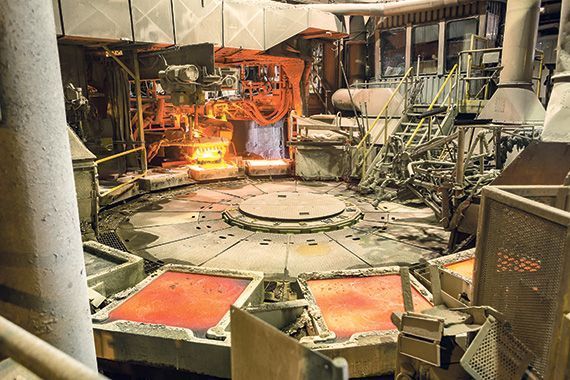You have to go back to 2004 to find the year the smelter’s stacks released more arsenic than they did in 2021, or 52 tons. (Photo: Courtesy Archive)
Although recent data from the federal government’s National Pollutant Release Inventory shows that the Horn smelter released 36 tons of arsenic into the air last year, more than any year since 2005, the company argues that “these emissions have been overstated because of the contamination probe used”.
According to the latest national pollutant release inventory, smelter owner Glencore reported releasing 36 tons of arsenic into the air at Rouyn-Noranda in 2021. For comparison, the company reported 14 tons in 2020.
Looking at the inventory, you have to go back to 2004 to find the year the smelter’s stacks released more arsenic than they did in 2021, or 52 tons.
In a publication entitled 2021 Annual Sustainable Development Bulletin, Glencore was pleased to make “continued efforts to reduce atmospheric emissions.”
But those efforts clearly did not bear fruit last year, according to Clementine Cornell, director general of the Abitibe-Tmiscaming Regional Environmental Council.
“It’s very concerning. We find ourselves in a very close picture of the beginning of the 2000s which is the worst moment in terms of arsenic in the air,” Ms. Cornell reported.
Exaggerated emissions due to pollution probe
According to Glencore, data for 2021 were overestimated, “Because of contamination of the probe used, contamination was detected after further rinsing of the probe and high levels of metals were detected in the rinse water.”
In an email sent to The Canadian Press, Glencore explained that of the five samples taken, two were taken with the contaminated probe and three were taken with a new probe.
So two out of five samples have abnormally high values and falsely increase the annual value. These two samples are 5 to 6 times higher than the averages of the other samples,” Glencore defends.
The National Pollutant Release Inventory is generic and contains the released, removed, and transferred pollutants of more than 320 pollutants at more than 7,000 facilities across the country.
These facilities include factories that produce various commodities, mines, oil and gas operations, as well as power plants and sewage treatment plants.
100 nanograms per cubic meter
In 2021, the level of arsenic in the air measured at the Ministry of Environment and Climate Change (MELCC) sampling station, located in front of the smelter, showed an average of 100 nanograms per cubic meter (ng/cubic metre). m3), which is 33 times more than the provincial level.
In 2020, the average was 70 nanograms per cubic meter at the same station.
Thus, the samples measured by this station are 1.4 times higher in 2021 than in 2020, while data from the National Pollutant Release Inventory show that the company released 2.5 times more in 2021. Compared to 2020 (36 compared to 14 ).
Before Glencore responded to The Canadian Press that 2021 emissions had been overstated due to contamination of the probe used, Abitibi-Témiscamingue Regional Environmental Council Director-General Clementine Cornell posited an explanation for this discrepancy.
“What that could mean is that the discharges and emissions are being sent into the air and possibly attenuated in all the surrounding air. Can it go further than this station? Can it go further into the lands of Roan Noranda? To the south, east, and west, And the North?”
Hence the interest, according to her, “to have a more complete observation” and “to go and install stations on a larger scale in the territory of Rouen-Noranda”.
The Minister of Environment, Benoit Charette, on Wednesday, during a visit to Rowen Noranda, raised the possibility of adding sampling stations to measure toxic emissions in the air, a request made by several doctors and citizen groups.

“Subtly charming problem solver. Extreme tv enthusiast. Web scholar. Evil beer expert. Music nerd. Food junkie.”

